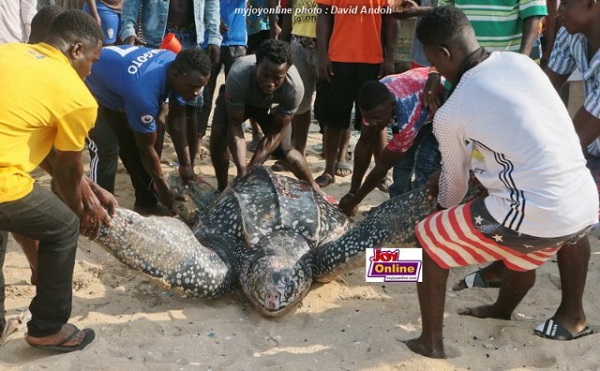A huge, black-coloured sea turtle that has been tagged by the University of Ghana became the centre of a standoff between local authorities and fishermen in Arkra, a fishing community in the Ekumfi District of the Central Region.
The animal, tagged with code numbers FGC 927, had appeared on the beach around 10:00 pm to lay eggs, according to eyewitnesses.
However, it was captured on Saturday, December 15 by five young fishermen who saw the appearance of the endangered reptile as an answered prayer from God.
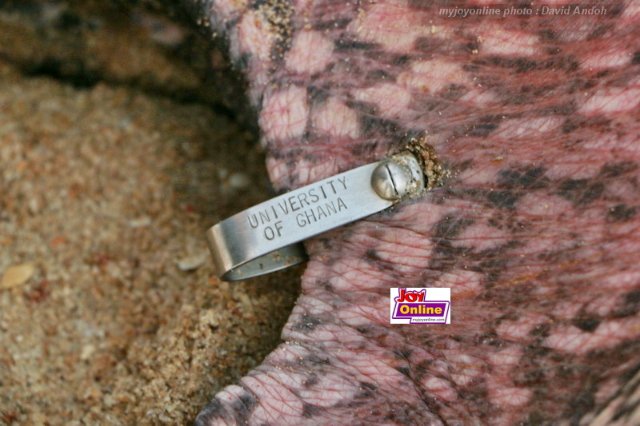
The fisher folks claim that prior to the appearance of the Leatherneck turtle, they had been praying to God to help them make a big catch so they sell and make money ahead of Christmas just a week away.
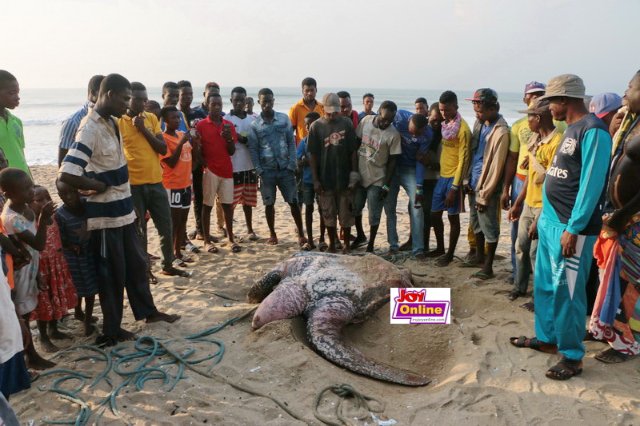
But after seeing the tag by the University of Ghana, they backed down on killing the animal and only prevented it from going back into the safety of the sea.
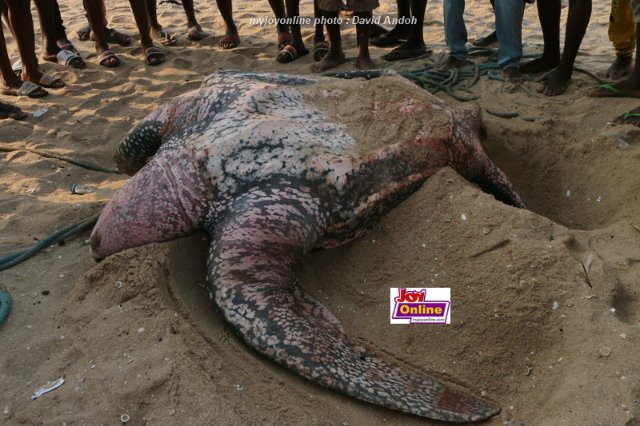
This was to enable them to think about ways to make money from the appearance of the endangered amphibian on the beach without killing it.
News eventually got to Nana Odziakopa Kofi Arko VII, Chief of Ekumfi Mbroboto, an adjoining community.

Together with the Assemblyman of the area, John Erskine, negotiations with the captors began via a mobile phone late Saturday evening.
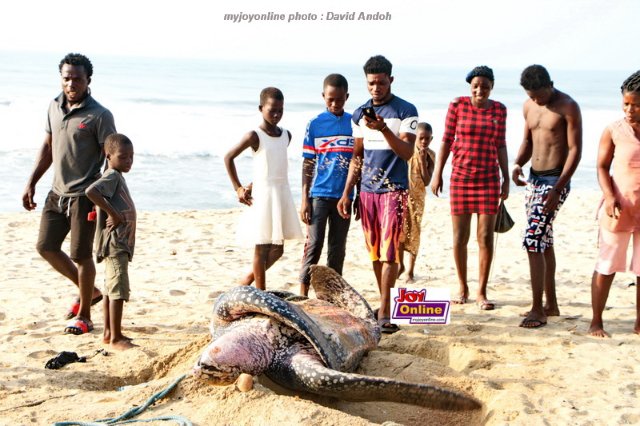
The chief and the Assemblyman pleaded with the fisherman not to change their mind against killing the reptile.

Nana Kofi Arko VII and Mr Erskine managed to get the fishermen to pledge that they will not kill the sea creature and promised to reward them.
The chief and the Assemblyman had to initiate the negotiation on a mobile phone because they were both in Accra, far from the beach the turtle had been captured.
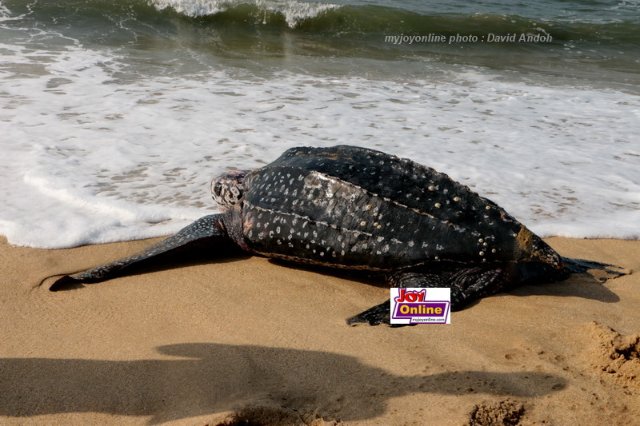
The captors had demanding GHS400 (about $80) before they release the animal and agreed to keep it safe.
They eventually turned into the protectors of the endangered animal, keeping wake all night on Saturday in anticipation of the ransom cash.
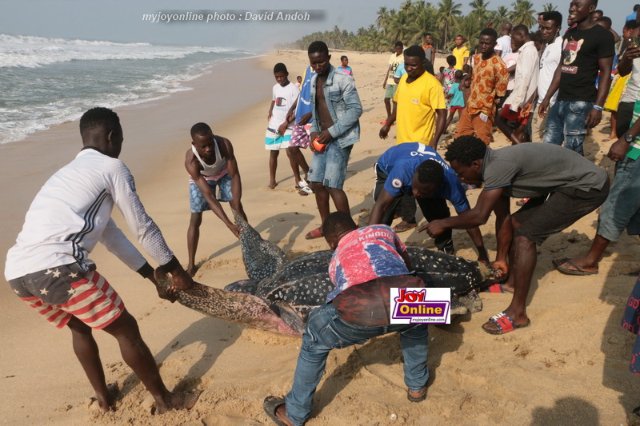
However, on Sunday they released the mammal back into the sea, hopeful that the chief and the Assembly will honour their promise to reward them -- at least with the GHS400 they had demanded.
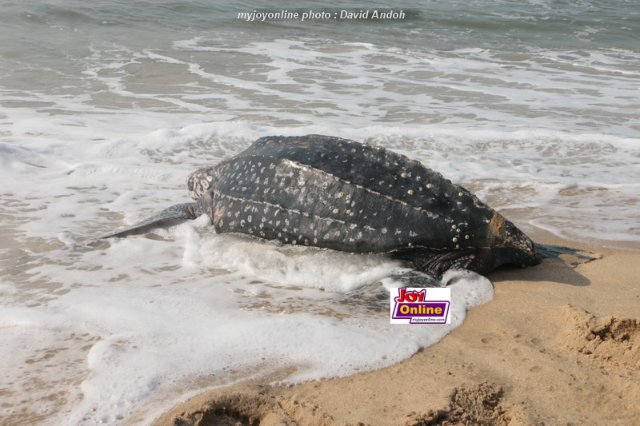
Action
Sea Turtle Specialist with the Wildlife Division of the Forestry Commission, Andrews Agyekumhene, explained Monday that a team from his outfit has been dispatched to the area to deal with the situation.
He said after seeing photos of the reptile sent to him by Myjoyonline.com, he can confirm that the sea turtle that is being held captive is the Leatherneck turtle, known scientifically as Dermochelys coricea.
It has been classified as “vulnerable†by the International Union for Conservation of Nature (IUCN), an international organisation working in the field of nature conservation and sustainable use of natural resources.
He explains that while the capture and killing of the endangered species are common at beaches across the Central Region, his outfit has remained relentless with educating local fishermen.
“We have to go to the communities for more education. Most of the fisher folks are migrants so we are usually dealing with new fishermen. We have to go the communities for more education,†he admits.
Mr Agyekumhene, who is also a Park Manager and Prosecutor for the Wildlife Division of the Forestry Commission said although Ghana’s law recognises the sea turtles and some specific sea creatures as endangered species, it is difficult to punish fishermen who catch them.
He said his outfit has mounted signages across beaches as a way of educating the fisher folks.
He explained that fishermen innocently catch these endangered species in their nets between October and February and because many of them do not know that they are endangered, they proceed with killing and selling their meat to local food vendors.
He said the situation has been compounded partly by the practice of some European tourists to pay local fisher folks cash to release captured turtles.
According to Mr Agyekumhene, the practice emboldens the fisherfolks to sometimes hold on to the animal until they get someone willing to ransom them.
He said his outfit is currently working with hotels, beach resorts and other players in the hospitality sector to get these European tourists to stop paying cash. Mr Agyekumhene suggests that education, instead of always paying a ransom, is the way to go.
Leatherneck turtles
Leatherneck turtles begin nesting once they reach 25 years of age.
“We placed tags in Winneba and Ada through the collaboration between University of Ghana, Wildlife Division, and Florida Gulf Coast University,†said Mr Agyekumhene.
He said it is likely that the turtle was tagged in either Ada or Winneba.
Source: myjoyonline

